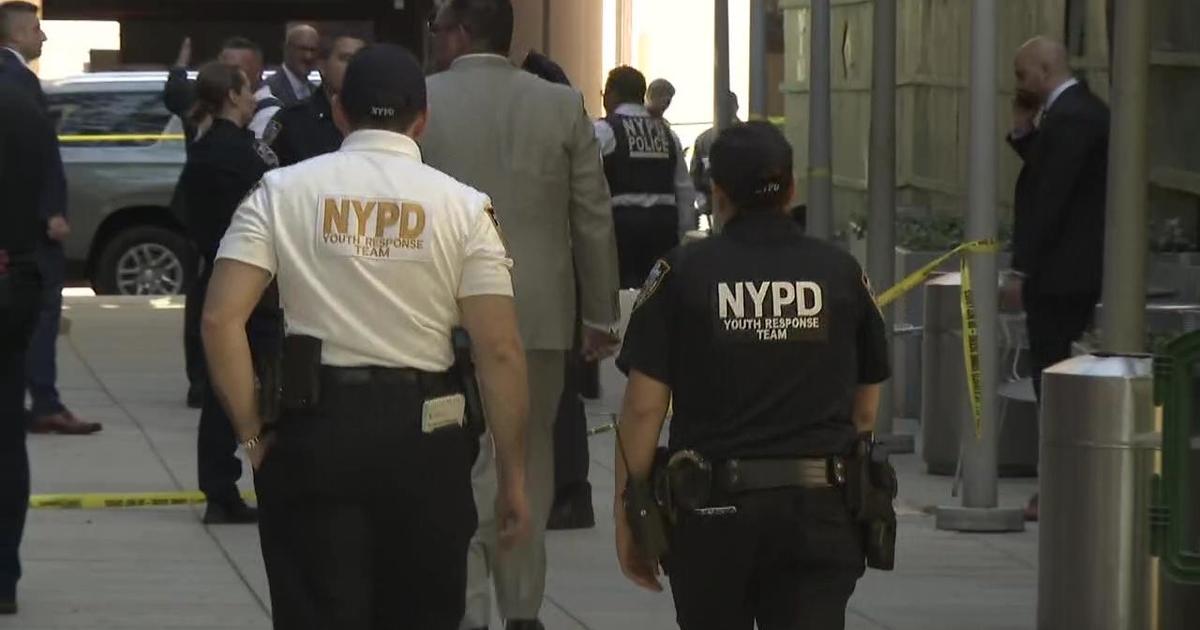Iconic Hollywood Actor Mickey Rooney Dies At 93
LOS ANGELES (CBSNewYork/AP) -- Mickey Rooney's approach to life was simple: "Let's put on a show!'' He spent nine decades doing it, on the big screen, on television, on stage and in his extravagant personal life.
Rooney died Sunday at age 93 surrounded by family at his North Hollywood home, police said. The Los Angeles County Coroner's office said Rooney died a natural death.
There were no further details immediately available on the cause of death, but Rooney did attend Vanity Fair's Oscar party last month, where he posed for photos with other veteran stars and seemed fine. He was also shooting a movie at the time of his death, "The Strange Case of Dr. Jeckyll and Mr. Hyde,'' with Margaret O'Brien.
PHOTOS: Remembering Mickey Rooney
A superstar in his youth, Rooney was Hollywood's top box-office draw in the late 1930s to early 1940s. He epitomized the "show'' part of show business, even if the business end sometimes failed him amid money troubles and a seesaw of career tailspins and revivals.
Pint-sized, precocious, impish and irrepressible, Rooney was nominated for four Academy Awards over a four-decade span and received two special Oscars for film achievements, won an Emmy for his TV movie "Bill'' and had a Tony nomination for his Broadway smash "Sugar Babies.''
"I loved working with Mickey on 'Sugar Babies.' He was very professional, his stories were priceless and I love them all --- each and every one. We laughed all the time,'' Carol Channing said.
A small man physically, Rooney was prodigious in talent, scope, ambition and appetite. He sang and danced, played roles both serious and silly, wrote memoirs, a novel, movie scripts and plays.
Rooney's personal life matched his film roles for color. His first wife was the glamorous and taller Ava Gardner, and he married seven more times, fathering seven sons and four daughters.
Through divorces, money problems and career droughts, he kept returning with customary vigor.
"I've been married so many times, I'm the only guy you know that has a marriage license made out 'to whom it may concern,'" Rooney once said.
Rooney was born Joesph Yule Jr. in 1920 in Brooklyn. He began as a toddler in his parents' vaudeville act in the 1920s and was barely six when he first appeared on screen, playing a midget in the 1926 silent comedy short "Not to Be Trusted.''
He was still at it more than 80 years later, working incessantly as he racked up about 250 screen credits in a career unrivaled for length and variety.
Among his roles in recent years was a part as a guard in the smash 2006 comedy "A Night at the Museum.''
"I always say, 'Don't retire, inspire,''' Rooney said in an interview with The Associated Press in March 2008. "There's a lot to be done.''
To the end, he was a non-stop talker continually proposing enterprises, some accomplished, some just talk: a chain of barbecue stands; training schools for talented youngsters; a Broadway show he wrote about himself and Judy Garland; screenplays, novels, plays.
Rooney was among the last survivors of Hollywood's studio era, which his career predated. Rooney signed a contract with MGM in 1934 and landed his first big role as Clark Gable as a boy in "Manhattan Melodrama.'' A loanout to Warner Bros. brought him praise as an exuberant Puck in Max Reinhardt's 1935 production of "A Midsummer Night's Dream,'' which also featured James Cagney and a young Olivia de Havilland.
Rooney was soon earning $300 a week with featured roles in such films as "Riff Raff,'' "Little Lord Fauntleroy,'' "Captains Courageous,'' "The Devil Is a Sissy,'' and most notably, as a brat humbled by Spencer Tracy's Father Flanagan in "Boys Town.''
The big break came with the wildly popular Andy Hardy series, beginning with "A Family Affair.''
"I knew 'A Family Affair' was a B picture, but that didn't stop me from putting my all in it,'' Rooney wrote. "A funny thing happened to this little programmer: released in April 1937, it ended up grossing more than half a million dollars nationwide.''
Rooney's peppy, all-American charm was never better matched than when he appeared opposite his friend and fellow child star Garland in such films as "Babes on Broadway'' and "Strike up the Band,'' musicals built around a plot of "Let's put on a show!'' One of them, the 1939 "Babes in Arms,'' brought him his first Oscar nomination. He was also in such dramas as "The Human Comedy,'' 1943, which gained Rooney his second Oscar nomination as best actor, and "National Velvet,'' 1944, with Elizabeth Taylor.
But Rooney became a cautionary tale for early fame. He earned a reputation for drunken escapades and quickie romances and was unlucky in both money and love. In 1942 he married for the first time, to Gardner, the statuesque MGM beauty. He was 21, she was 19.
"I'm 5 feet 3, but I was 6 feet 4 when I married Ava,'' he said in later years. The marriage ended in a year, and Rooney joined the Army in 1943, spending most of his World War II service entertaining troops.
Rooney returned to Hollywood and disillusionment. His savings had been stolen by a manager and his career was in a nose dive. He made two films at MGM, then his contract was dropped.
"I began to realize how few friends everyone has,'' he wrote in his second autobiography. "All those Hollywood friends I had in 1938, 1939, 1940 and 1941, when I was the toast of the world, weren't friends at all.''
His movie career never regained its prewar eminence. "The Bold and the Brave,'' 1956 World War II drama, brought him an Oscar nomination as best supporting actor. But mostly, he played second leads in such films as "Off Limits'' with Bob Hope, "The Bridges at Toko-Ri'' with William Holden, and "Requiem for a Heavyweight'' with Anthony Quinn.
In the early 1960s, he had a wild turn in "Breakfast at Tiffany's'' as Audrey Hepburn's bucktoothed Japanese neighbor and was among the fortune seekers in the all-star comedy "It's a Mad Mad Mad Mad World.''
Rooney's starring roles came in low-budget films such as "Drive a Crooked Road,'' "The Atomic Kid,'' "Platinum High School," "The Twinkle in God's Eye'' and "How to Stuff a Wild Bikini.''
But his later career proved his resilience: The Oscar nomination for "Black Stallion.'' The "Sugar Babies'' hit that captivated New York, London, Las Vegas and major U.S. cities.
Voicing animated features like "The Fox and the Hound,'' "The Care Bears Movie'' and "Finding Nemo.'' An Emmy for his portrayal of a disturbed man in the 1981 TV movie "Bill.'' Teaming with his eighth wife, Jan, off-Broadway in 2004 for a musical look back at his career called, fittingly, "Let's Put On a Show.''
Over the years, Rooney also made hundreds of appearances on TV talk and game shows, dramas and variety programs. He starred in three series: "The Mickey Rooney Show'' (1954), "Mickey'' (1964) and "One of the Boys'' (1982). All lasted one season and a co-star from "One of the Boys,'' Dana Carvey, later parodied Rooney on "Saturday Night Live,'' mocking him as a hopeless egomaniac who couldn't stop boasting he once was "the number one star --- IN THE WOOORLD!''
In 1983, the Motion Picture Academy presented Rooney with an honorary Oscar for his "60 years of versatility in a variety of memorable film performances.'' That matched the 1938 special award he shared with Deanna Durbin for "bringing to the screen the spirit and personification of youth.''
A lifelong storyteller, Rooney wrote two memoirs: "i.e., an Autobiography'' published in 1965; "Life Is Too Short,'' 1991. He also produced a novel about a child movie star, "The Search for Sonny Skies,'' in 1994.
After a lifetime of carrying on, he became a devoted Christian and member of the Church of Religious Science. He settled in suburban Thousand Oaks, about 40 miles west of Los Angeles.
In 2011, Rooney was in the news again when he testified before Congress about abuse of the elderly, alleging that he was left powerless by a family member who took and misused his money.
"I felt trapped, scared, used and frustrated,'' Rooney told a special Senate committee considering legislation to curb abuses of senior citizens. "But above all, when a man feels helpless, it's terrible.''
That year Rooney took his stepson Christopher Aber and others to court on allegations that they tricked him into thinking he was on the brink of poverty while defrauding him out of millions and bullying him into continuing to work.
At the time, Aber declined comment on the suit except to say, "this lawsuit is not from Mickey Rooney, it's from his conservators who are stealing from him.'' The New York Times reported that the suit was settled last year.
Check Out These Other Stories From CBSNewYork.com:
(TM and © Copyright 2014 CBS Radio Inc. and its relevant subsidiaries. CBS RADIO and EYE Logo TM and Copyright 2014 CBS Broadcasting Inc. Used under license. All Rights Reserved. This material may not be published, broadcast, rewritten, or redistributed. The Associated Press contributed to this report.)




